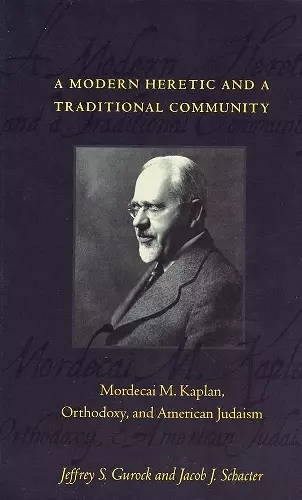A Modern Heretic and a Traditional Community
Mordecai M. Kaplan, Orthodoxy, and American Judaism
Jeffrey S Gurock author Jacob Schacter author
Format:Hardback
Publisher:Columbia University Press
Published:26th Mar '97
Currently unavailable, and unfortunately no date known when it will be back

Mordecai Kaplan, the founder of the Reconstructionist movement, was the most influential and controversial radical Jewish thinker in the twentieth century. This book examines the intellectual influences that moved Kaplan from Orthodoxy and analyzes the combination of personal, strategic, and career reasons that kept Kaplan close to Orthodox Jews, posing a question crucial to the understanding of any religion: Can an established religious group learn from a heretic who has rejected its most fundamental beliefs?
Examining the intellectual influences that prompted Mordecai M. Kaplan to reject fundamental Orthodox precepts, this text asks whether an established religious group can learn from a heretic who has rejected its most fundamental beliefs.Mordecai M. Kaplan, the founder of the Reconstructionist movement, was the most influential and controversial radical Jewish thinker in the 20th century. Examining the intellectual influences that prompted Kaplan to reject fundamental Orthodox precepts, Jeffrey S. Gurock and Jacob J. Schacter ask a question crucial to the understanding of any religion: can an established religious group learn from a heretic who has rejected its most fundamental beliefs? More than a biography, "A Modern Heretic and a Traditional Community" is also a social history of American Orthodoxy and of American Judaism over the last century. It demonstrates the wide range of beliefs and practices Orthodoxy allowed in America and makes a distinct contribution to the fabric of American social history, Judaism and the history of religion in the United States.
This fine biography focuses not only on the emergence of Kaplan's unique thought and approach to Judaism but on the larger thought-world of American orthodoxy from which his thinking emerged and with which it stood in continuing debate. The resultant study not only lays bare Kaplan's mind and personality but, equally important, reveals much about the nature of American Orthodoxy. Choice As important thinkers in the Orthodox world [the authors] help us to see Kaplan from the vantage point of the world that raised him, New York's Orthodox community. In exploring how its different elements responded to Kaplan, they give us a richer understanding of Orthodoxy. Jewish Book World
ISBN: 9780231106269
Dimensions: unknown
Weight: unknown
256 pages